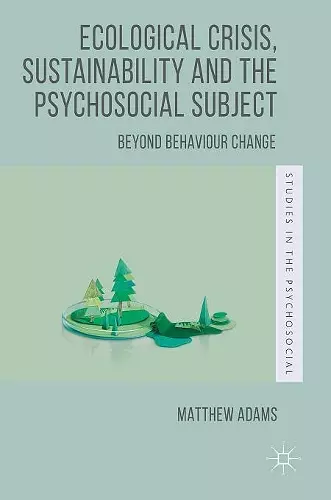Ecological Crisis, Sustainability and the Psychosocial Subject
Beyond Behaviour Change
Format:Hardback
Publisher:Palgrave Macmillan
Published:14th Nov '16
Should be back in stock very soon
This hardback is available in another edition too:
- Paperback£49.99(9781349674817)

"Transcending the all-too-frequent division of environmental politics into individual motivation and ecological science, this book convincingly connects subjectivity, social dynamics, and material realities to realise an impressively comprehensive account of climate change. As Adams shows, an adequate understanding of climate change cannot be achieved simply through natural or psychological science. Exploring the interplay of cultural, social, and psychological aspects, he outlines a more integrated and systemic perspective that does justice to the complexities of humanity's unfolding destiny in the 'Anthropocene'. With clarity and skill, Adams demonstrates the need for a social understanding of climate change that connects the otherwise disparate accounts of psychology and physical science. This book is a major step towards a more integrated environmental understanding." (David Kidner, Professor of Psychology, Nottingham Trent University, UK) "Ecological crisis, sustainability & the psychosocial is an important sign that scholarship within psychology and the social sciences is at last responding to the big questions of global system crisis we all now face. Rejecting the tired and largely ineffective 'behaviour change' paradigm of mainstream social science, Matt Adams articulates a broadly psychosocial alternative capable of unpicking the systemic and interrelated social and psychological dynamics that, in the context of our existing political and economic systems serve to maintain our destructive behaviour. The book is based on sustained thoughtful scholarship tempered by an activist spirit. It is a 'must read' for all who care about the relationship between their environment and the challenge of humanity's future." (Paul Stenner, Professor of Social Psychology, The Open University, UK) "How do we span the gulf between analyses of the relationship between capital and the ecological crisis, and reductionist behaviour change approaches to climate change? Matthew Adams addresses this question with a timely and invaluable contribution to the literature - a collection of chapters which sets psychosocial perspectives on climate change in their cultural, societal and historical settings, that will be of interest and value to researchers and lecturers across a range of disciplines." (David Uzzell, Professor of Environmental Psychology, University of Surrey, UK)
This book draws on recent developments across a range of perspectives including psychoanalysis, narrative studies, social practice theory, posthumanism and trans-species psychology, to establish a radical psychosocial alternative to mainstream understanding of 'environmental problems'.This book draws on recent developments across a range of perspectives including psychoanalysis, narrative studies, social practice theory, posthumanism and trans-species psychology, to establish a radical psychosocial alternative to mainstream understanding of 'environmental problems'. Only by addressing the psychological and social structures maintaining unsustainable societies might we glimpse the possibility of genuinely sustainable future. The challenges posed by the reality of human-caused 'environmental problems' are unprecedented. Understanding how we respond to knowledge of these problems is vital if we are to have a hope of meeting this challenge. Psychology and the social sciences have been drafted in to further this understanding, and inform interventions encouraging sustainable behaviour. However, to date, much of psychology has appeared happy to tinker with individual behaviour change, or encourage minor modifications in the social environment aimed at 'nudging' individual behaviour. As the ecological crisis deepens, it is increasingly recognised that mainstream understandings and interventions are inadequate to the collective threat posed by climate change and related ecological crises.
ISBN: 9781137351593
Dimensions: unknown
Weight: unknown
278 pages
1st ed. 2016